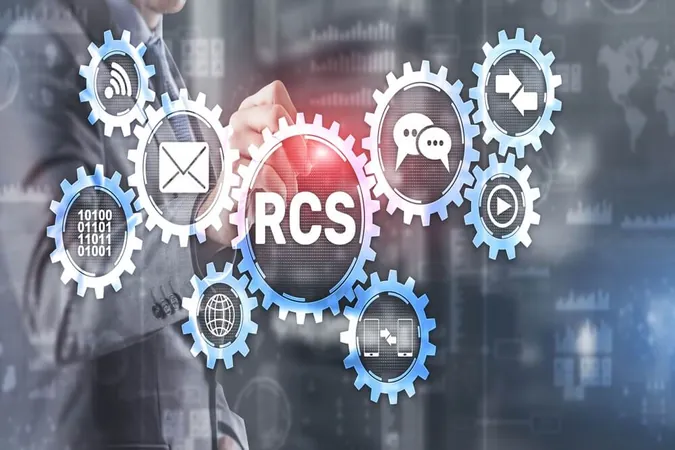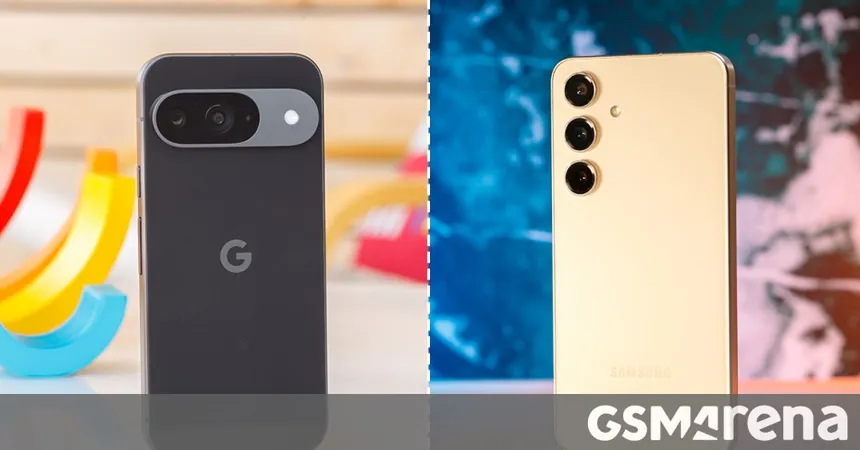
SMS vs. RCS: The Dynamic Duo Transforming Customer Engagement
2024-12-09
Author: Jacob
SMS vs. RCS: The Dynamic Duo Transforming Customer Engagement
In today's fast-paced digital communication landscape, SMS (Short Message Service) and RCS (Rich Communication Services) are at the forefront of customer engagement strategies. While the discourse often pits them against one another, the truth is they are more like partners, each with its distinctive advantages that can enhance businesses' ability to connect with consumers.
SMS: The Timeless Communicator
Since its inception in the early 1990s, SMS has secured its status as the most dependable mobile communication tool, boasting over 5 billion users globally. Its unmatched reach and compatibility across various devices make SMS a favorite for brands looking to communicate with their customers without barriers.
One standout feature of SMS is its impressive open rate, hovering around 98%. Most messages are read within minutes, making SMS particularly effective for urgent communications. Examples of effective SMS usage include:
- **Transactional Alerts:** Important account notifications, OTPs, and reminders.
- **Promotional Campaigns:** Flash sales, limited-time offers, and event announcements.
- **Public Service Announcements:** Critical updates and emergency alerts.
SMS's affordability and reliability have made it especially popular in emerging markets where smartphone penetration is still growing. However, it's not without its drawbacks—specifically, the 160-character limit and lack of rich media options.
RCS: The Future of Messaging
Launched in 2008, RCS is often hailed as the next generation of messaging. By combining the straightforwardness of SMS with enhanced features, RCS offers businesses a richer communication platform. The benefits of RCS include:
- **Multimedia Messaging:** Sending images, videos, and documents in high resolution.
- **Branded Experiences:** Customizable messages featuring logos and brand colors.
- **Interactivity:** Tools for customer interaction such as quick replies and chatbots.
RCS allows for a deeper level of customer engagement, empowering brands to provide tailored experiences across various sectors:
- **Retail:** Virtual catalogs and personalization to entice shoppers.
- **Travel and Hospitality:** Offering booking confirmations and multimedia guides.
- **Banking:** Secure, interactive support channels for customers.
Despite its advantages, RCS adoption has faced challenges, primarily due to limited carrier support. However, there are promising developments. As of last year, Google reported over one billion monthly active RCS users, and the landscape continues to evolve—particularly with Apple’s announcement of plans to support RCS in the future.
Global Reach and Market Adaptability
While SMS is renowned for its vast global reach, RCS is at its best in areas with a high proportion of smartphones and robust data availability. Businesses must navigate this duality effectively; in countries like India, SMS remains the preferred medium for critical updates, while RCS is gaining popularity among tech-savvy urbanites.
The Future Evolution of RCS
As more telecom operators and device manufacturers back RCS, we can expect significant penetration increases. Future advancements may include:
- **AI and Automation:** Enabling hyper-personalized interactions based on predictive analytics.
- **Localization:** Crafting messages tailored to specific regional languages and cultural preferences.
- **Real-Time Metrics:** Enhanced tracking capabilities providing deeper insights into customer engagement.
The integration of generative AI could revolutionize RCS interactions, allowing chatbots to deliver personalized experiences that genuinely feel human.
The Case for SMS and RCS Coexistence
Rather than choosing between SMS and RCS, businesses must realize the potential of a hybrid strategy that exploits the strengths of both platforms. Consider these key points:
- **Reliability vs. Engagement:** SMS offers the reliability necessary for urgent communications, while RCS excels in delivering engaging content.
- **Cost vs. Luxury:** SMS is a cost-effective medium for broad outreach; RCS provides a premium platform tailored for specialized interactions.
- **Ubiquity vs. Rich Media:** SMS works universally, while RCS is better suited for tech-forward users who crave richer interactions.
For instance, a retailer could send a broad SMS to announce a discount while using RCS to display an interactive product showcase for loyalty program members.
Looking Ahead to 2025 and Beyond
As we edge closer to 2025, the boundaries between SMS and RCS will increasingly blur, reflecting the evolving demands of a connected customer base. SMS will remain central to universal communication, augmented by AI-enhanced personalization capabilities, while RCS will solidify its standing as a critical platform for engaging customers meaningfully.
In conclusion, the coexistence of SMS and RCS isn’t merely a possibility—it’s a necessity for businesses aiming to thrive. Embracing both channels will enable brands to create compelling, customer-centric communication strategies that resonate across diverse demographics. The future is here, and those who adapt will undoubtedly lead the charge in customer engagement excellence!









 Brasil (PT)
Brasil (PT)
 Canada (EN)
Canada (EN)
 Chile (ES)
Chile (ES)
 España (ES)
España (ES)
 France (FR)
France (FR)
 Hong Kong (EN)
Hong Kong (EN)
 Italia (IT)
Italia (IT)
 日本 (JA)
日本 (JA)
 Magyarország (HU)
Magyarország (HU)
 Norge (NO)
Norge (NO)
 Polska (PL)
Polska (PL)
 Schweiz (DE)
Schweiz (DE)
 Singapore (EN)
Singapore (EN)
 Sverige (SV)
Sverige (SV)
 Suomi (FI)
Suomi (FI)
 Türkiye (TR)
Türkiye (TR)